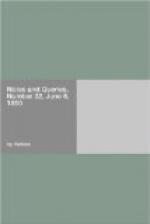“Mr. Chinnery then, an M.A. of great
parts,
Sang the praises of Chancellor
Grenville.
Oh! he pleased all the ladies and tickled
their hearts;
But, then, we all know he’s
a Master of Arts,
With
his rowly powly,
Gammon
and spinach,
Heigh
ho! says Rowley.”
CHETHAMENSIS.
Wimpole Street, May 11. 1850.
Arabic Numerals.—As your correspondent E.V. (Vol. i., p. 230.) is desirous of obtaining any instance of Arabic numerals of early occurrence, I would refer him, for one at least, to Notices of the Castle and Priory of Castleacre, by the Rev. J.H. Bloom: London; Richardson, 23. Cornhill, 1843. In this work it appears that by the acumen of Dr. Murray, Bishop of Rochester, the date 1084 was found impressed in the plaster of the wall of the priory in the following, form:—
1
4 x 8
0
The writer then goes on to show, that this was the regular order of the letters to one crossing himself after the Romish fashion.
E.S.T.
Pusan (Vol. i., p. 440.)—May not the meaning be a collar in the form of a serpent? In the old Roman de Blanchardin is this line:—
“Cy guer pison tuit Apolin.”
Can Iklynton again be the place where such an ornament was made? Ickleton, in Cambridgeshire, appears to have been of some note in former days, as, according to Lewis’s Topog. Hist., a nunnery was founded there by Henry II., and a market together with a fair granted by Henry III. As it is only five miles from Linton, it may have formerly borne the name of Ick-linton.
C.I.R.
“I’d preach as though” (Vol. i., p. 415.).—The lines quoted by Henry Martyn are said by Dr. Jenkyn (Introduction to a little vol. of selections from Baxter—Nelson’s Puritan Divines) to be Baxter’s “own immortal lines.” Dr. J. quotes them thus:—
“I preached as never sure to preach
again,
And as a dying man to dying men.”
ED. S. JACKSON.
May 18.
“Fools rush in” (Vol. i., p. 348.).—The line in Pope,
“For fools rush in where angels fear to tread,”
it has been long ago pointed out, is founded upon that of Shakspeare,
“For wrens make wing where eagles dare not perch.”
I know not why that line of Pope is in your correspondent’s list. It is not a proverb.
C.B.
Allusion in Friar Brackley’s Sermon (Vol. i., p. 351.)—It seems vain to inquire who the persons were of whom stories were told in medieval books, as if they were really historical. See the Gesta Romanorum, for instance: or consider who the Greek king Aulix was, having dealings with the king of Syria, in the 7th Story of the Novelle Antiche. The passage in the sermon about a Greek king, seems plainly to be still part of the extract from the Liber Decalogorum, being in Latin. This book was perhaps the Dialogi decem, put into print at Cologne in 1472: Brunet.




